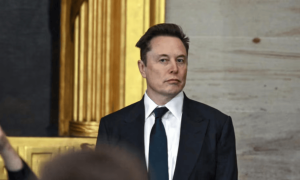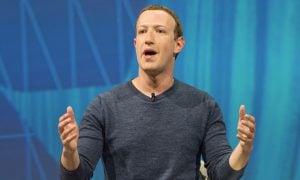Meta CEO Mark Zuckerberg’s recent announcement that he would be ending professional fact-checking on Facebook and Instagram signals a significant shift in the company’s approach to political content. The decision, unveiled Tuesday, marks the culmination of months of efforts to position the social media giant to navigate the conservative pressures expected from a potential second term of Donald Trump.
Zuckerberg, who has long been known for supporting progressive causes, appears to be recalibrating his company’s policies to align with a more right-leaning stance. In the past, Zuckerberg has engaged in high-profile meetings with former President Barack Obama and criticized his administration at times, particularly in matters related to privacy and tech regulations. However, over the last year, Zuckerberg’s actions have hinted at a clear pivot toward embracing conservative influences.
The first sign of this shift came in July 2024, when Zuckerberg publicly praised Trump’s defiant response after an assassination attempt, calling it “one of the most badass things I’ve ever seen.” Although Zuckerberg quickly clarified that he was not endorsing any presidential candidate, the comment set the stage for what would become a series of moves signaling alignment with conservative positions.
In the same month, Meta made a pivotal decision to lift the special restrictions placed on Trump’s Facebook and Instagram accounts following the January 6, 2021, Capitol riot. This move effectively restored Trump’s access to Meta’s platforms, signaling the company’s willingness to embrace a more lenient approach toward the former president.
By August, Zuckerberg escalated his rhetoric, criticizing the Biden administration for its handling of COVID-19 misinformation. He accused the government of pressuring Meta to censor content, a sharp contrast to the company’s earlier stance, which had taken a firm position against misleading health information during the pandemic.
Further demonstrating his political pivot, Zuckerberg allowed a personal threat made by Trump to go unaddressed. Trump had released a book in which he ominously claimed Zuckerberg would “spend the rest of his life in prison” if he attempted to interfere with the 2024 election. Meta did not comment on the statement, an indication of the company’s increasing detachment from its previous, more critical stance toward Trump.
Amid these changes, Meta’s corporate political action committee (PAC) notably refrained from donating to either of the major presidential candidates during the 2024 election cycle. However, individual Meta employees contributed heavily to Vice President Kamala Harris’ campaign, raising nearly $2 million, according to the transparency website OpenSecrets. The PAC also made contributions to both Republican and Democratic Senate campaigns, highlighting a more neutral posture in some respects, though the company’s recent leadership appointments have leaned more conservative.
In December, Meta revealed that it had donated $1 million to Trump’s inaugural fund, signaling further support for the former president’s political future. Moreover, Zuckerberg made headlines last week by appointing Joel Kaplan, a longtime Republican insider, as Meta’s head of global policy, replacing Nick Clegg, a former British deputy prime minister with more liberal leanings. Kaplan’s appointment underscores Zuckerberg’s growing reliance on conservative political strategists.
These moves have drawn sharp criticism from some observers. Nina Jankowicz, a disinformation expert, called Zuckerberg’s shift a “full bending of the knee to Trump” and criticized the company’s direction as part of a broader trend of tech leaders catering to right-wing agendas. Others, however, suggest Zuckerberg is simply trying to adapt to the political realities of the moment.
David Sacks, a venture capitalist and Trump adviser, praised Zuckerberg’s decision, calling it a “turning point” in U.S. political and cultural realignment. Zuckerberg’s pivot is significant not only because of the potential return of Trump to power but also due to Meta’s dominant role in shaping online communication. Meta’s suite of apps—Facebook, Instagram, WhatsApp, and Messenger—are among the most widely used platforms in the world, giving Zuckerberg immense influence over public discourse.
Zuckerberg’s shift is not just about political convenience; it is also tied to the company’s financial and regulatory interests. Meta faces ongoing legal challenges, including a high-profile antitrust case brought by the Federal Trade Commission over its 2012 acquisition of Instagram. As Meta navigates these pressures, its increasingly conservative policy shift may also be a strategy to better align with a potential Republican administration, especially in light of the growing influence of right-leaning political figures within the company.
Over the years, Zuckerberg has cultivated relationships with both Democratic and Republican leaders, from Obama to former House Speaker Paul Ryan. However, Meta’s top ranks have increasingly been filled by Republicans. Kaplan’s promotion is just one example of how the company is adjusting to shifting political tides. Other notable Republicans in Meta’s leadership include Jennifer Newstead, Meta’s chief legal officer, who previously served in the George W. Bush administration, and Kevin Martin, Meta’s new vice president of public policy, who also has deep ties to Republican administrations.
Zuckerberg’s decision to hire key Republican operatives such as Dustin Carmack, a former adviser to Florida Gov. Ron DeSantis, reflects his growing embrace of conservative political strategies. Meta’s corporate culture has shifted significantly since Sheryl Sandberg, once the company’s most prominent Democrat, left her day-to-day role in 2022.
Despite these moves, Zuckerberg insists that his shift is not a departure from his core values. In a recent video explaining the changes, he referenced a 2019 speech in which he criticized “traditional gatekeepers in politics or media,” suggesting that the latest policy adjustments were part of his long-standing vision to reduce content moderation.
The coming years will reveal whether Zuckerberg’s pivot is part of a broader trend in corporate America or a strategic move aimed at positioning Meta for political and regulatory influence in a potential second Trump administration. However, with Meta’s growing influence over global communication and its increasing ties to conservative politics, the implications of Zuckerberg’s decision will be felt across the digital landscape for years to come.

Recommended for you
He Photographed Naked Straight Men—And Changed Queer History Forever by Rainbow Media
The provocative art of physique photographer Dave Martin.
Read on Substack





